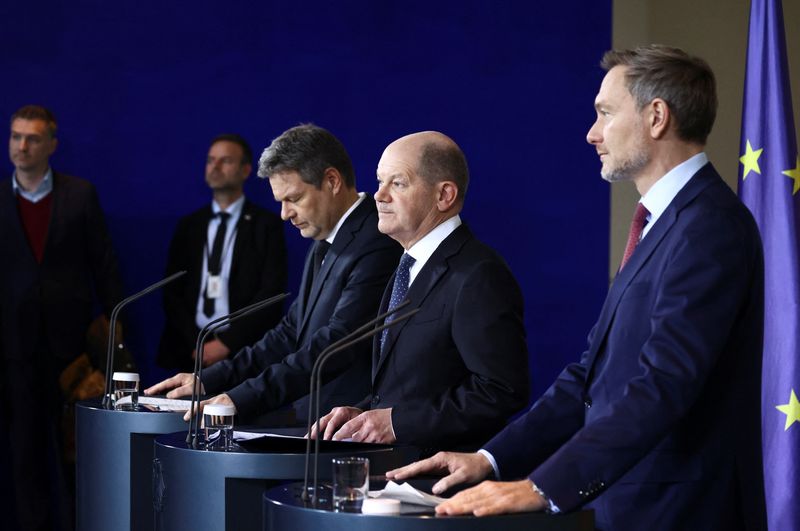By Maria Martinez
BERLIN (Reuters) -German Chancellor Olaf Scholz's three-party coalition announced on Wednesday an agreement on the draft budget for 2024 following weeks of negotiations after a court ruling last month threw the government's finances into disarray.
Finance Minister Christian Lindner said fiscal consolidation will continue in 2024, with the debt-to-GDP ratio falling to 64% and the budget deficit to 1.5%.
Here are the main elements of the budget deal:
RETURN OF THE DEBT BRAKE
Germany's coalition government has agreed at least initially not to declare an emergency situation for next year which would suspend self-imposed rules limiting net new borrowing.
Germany sees itself as the European defender of solid finances with its so-called "debt brake" restricting the public deficit to 0.35% of GDP.
The court ruling forced the government to suspend the constitutionally enshrined debt brake for the 2023 budget.
Finance minister Lindner, of the fiscally conservative Free Democrats (FDP), insisted the debt brake should be reinstated for 2024, while Scholz's centre-left Social Democrats (SPD) and the Greens had hoped to suspend it for the fifth year in a row.
The coalition has now agreed that it will stick to the debt brake in 2024, although it did leave the door open to suspending the debt brake later, for example if the situation in Ukraine worsens and Kyiv needs more aid.
UKRAINE SUPPORT
Scholz said support for Ukraine would continue, after the budget turmoil raised questions over how much military aid Berlin was willing to commit.
Germany will double support for Kyiv to 8 billion euros next year compared to 2023, with an additional 6 billion euros for Ukrainian refugees.
SPENDING CUTS
The coalition has agreed to plug a 17-billion-euro ($18.32 billion) hole in its budget for 2024 by cutting climate-damaging subsidies, spending in some ministries and federal grants.
A climate and transformation fund, designed to support companies' transition towards greener practices, will be reduced by 12 billion euros in 2024 and by 45 billion euros in the financial planning up to 2027, although Scholz said the fund will still have a total volume of 160 billion euros.
Cuts will affect the transport and construction ministries, as well as subsidies for the solar industry.
Premiums for the purchase of electric cars are to be ended earlier than previously planned. They had been set to expire at the end of next year.
Lindner said there would be no reduction in social standards, but savings of 1.5 billion euros would be made through "more accuracy in social benefits," putting as example a better placement of Ukrainian refugees in the labour market.
TAXATION
Lindner had resisted proposals to hike taxes to fill the spending gap, but some taxation measures made it into the deal.
A document from Habeck's economy ministry, seen by Reuters, mentioned plans to introduce a tax on kerosene fuel for domestic flights.
The government will save 1.4 billion euros per year with new plastic regulations. In the future, companies that put plastic into circulation will pay the levy, which was previously paid by the German government to the EU.
A CO2 surcharge on fuel, heating oil and gas is to be increased, under the coalition agreement.
A package of support measures for industry drawn up in response to high electricity prices will meanwhile go ahead as planned. This includes cutting the electricity tax to the minimum level permitted by European Union law for all manufacturing firms.

The Growth Opportunities Act, a multibillion-dollar tax relief package for small and medium-sized companies, is also included in the budget.
($1 = 0.9307 euros)